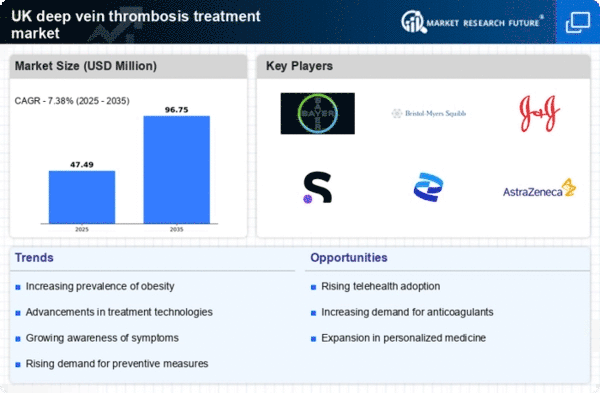Rising Awareness and Education
There is a growing awareness regarding deep vein thrombosis among both healthcare professionals and the general public in the UK. Educational campaigns aimed at highlighting the symptoms and risks associated with DVT are becoming more prevalent. This increased awareness is likely to lead to earlier diagnosis and treatment, which could positively impact the deep vein-thrombosis-treatment market. According to surveys, nearly 60% of the population now recognizes the importance of seeking medical attention for symptoms related to DVT. As awareness continues to rise, it is anticipated that more individuals will seek treatment, thereby driving market growth and encouraging healthcare providers to invest in better treatment options.
Government Initiatives and Funding
Government initiatives aimed at improving healthcare access and funding for DVT treatments are likely to influence the deep vein-thrombosis-treatment market positively. The UK government has been actively investing in healthcare infrastructure, which includes funding for research and development of new treatment options. Recent allocations indicate an increase in funding for vascular health programs, which may enhance the availability of advanced DVT treatments. Such initiatives not only improve patient access to necessary therapies but also encourage innovation within the market. As a result, the deep vein-thrombosis-treatment market may experience growth driven by enhanced healthcare policies and increased financial support for DVT management.
Advancements in Treatment Modalities
Innovations in treatment modalities for deep vein thrombosis are likely to propel the deep vein-thrombosis-treatment market forward. The introduction of new anticoagulants and minimally invasive procedures, such as catheter-directed thrombolysis, has transformed the management of DVT. Recent data indicates that the market for anticoagulants is projected to reach £2 billion by 2026, reflecting a robust growth trajectory. These advancements not only enhance patient outcomes but also reduce the risk of complications associated with traditional treatments. As healthcare professionals increasingly adopt these novel therapies, the deep vein-thrombosis-treatment market is poised for significant growth, driven by improved efficacy and safety profiles of new treatment options.
Increasing Prevalence of Risk Factors
The rising incidence of conditions such as obesity, diabetes, and sedentary lifestyles in the UK appears to be a significant driver for the deep vein-thrombosis-treatment market. According to recent health statistics, approximately 28% of adults in the UK are classified as obese, which is a known risk factor for deep vein thrombosis (DVT). This growing prevalence of risk factors is likely to lead to an increase in DVT cases, thereby driving demand for effective treatment options. Furthermore, the aging population, with a notable increase in individuals over 65 years, also contributes to the rising number of DVT cases. As healthcare providers focus on managing these risk factors, the deep vein-thrombosis-treatment market is expected to expand, with a greater emphasis on preventive measures and treatment protocols.
Integration of Telemedicine in Treatment
The integration of telemedicine into the management of deep vein thrombosis is emerging as a key driver for the deep vein-thrombosis-treatment market. With the rise of digital health solutions, patients can now receive consultations and follow-up care remotely, which is particularly beneficial for those with mobility issues or those living in remote areas. This shift towards telehealth services is likely to enhance patient engagement and adherence to treatment protocols. Recent studies suggest that telemedicine can improve patient outcomes by facilitating timely interventions. As telehealth continues to gain traction, it is expected to play a crucial role in expanding the reach of DVT treatments, thereby contributing to the growth of the market.

















